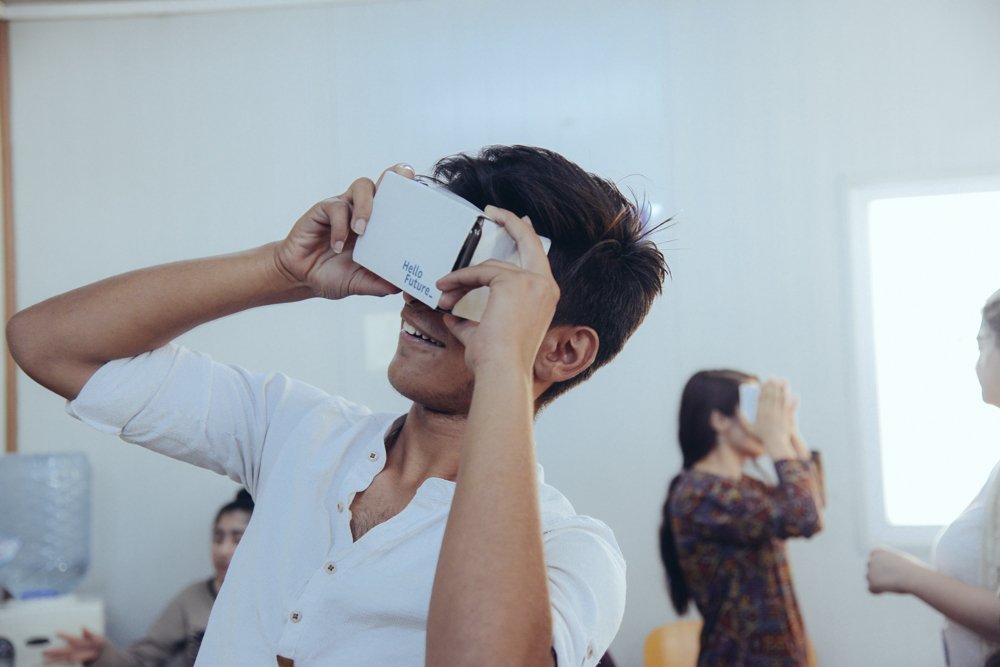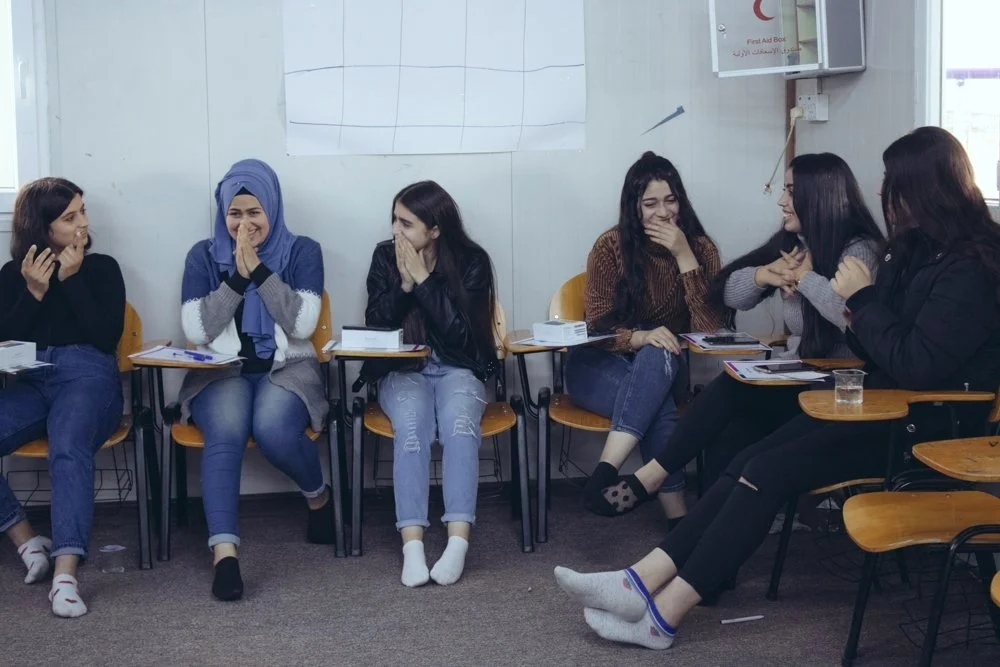2016
Immersion & Research
Hello Future’s founder and executive director, Charlie Grosso, first visited Arbat Camp in 2016. While anticipating a quick visit, she was struck by the lack of opportunities for teenagers who had spent most of their lives in the camp. The school system was lacking compared to the Syrian system, and it was even worse for refugees who were behind because of their initial displacement. The lack of opportunity, infrastructure, and support left many refugee teens feeling stuck and alone. Charlie wanted to create a new path forward for the incredibly capable, passionate, and smart youth to recognize their potential and restore hope.
2017
Pilot Program
In 2017, Hello Future launched its pilot program with 19 students. The 5 day intensive focusing on critical thinking and digital literacy was extended to 10 days in the field after realizing how much content the students wanted to digest. They learned to use Google tools like Sheets and Slides, ways to engage with social media, and how to best navigate the internet. The students worked on their ability to tell personal stories by utilizing photography and channeled their unique experiences into professional resumes. Seeing the impact of just two weeks on so many students’ perspective on their futures convinced Charlie to find ways to continue the program on a bigger scale.
2018
Planning & Fundraising
2018 was a year of planning and fundraising. After seeing the success of the pilot program, Charlie was determined to continue Hello Future’s programming and streamline the curriculum. She worked to raise awareness about the refugee youth living in Arbat Camp and find donors who supported her innovative vision of education and entrepreneurship. Embracing the interconnected nature of any social work and social innovation, Charlie recognized the importance of social-emotional learning and trauma reduction for refugee teens. They need to be healthy, physically and mentally, before we can work on any additional skills and learnings. Working with Columbia University SIPA program, a measurement and evaluation system based on USAID Positive Youth Development metric was created.
2019
Local Instructors
Native Language
The current iteration of Hello Future started in 2019 with the kickoff of the month-long digital literacy program, focusing on building a foundation of hard and soft skills through project-based learning. The students learned internet navigation, media literacy, and email etiquette, but also broader concepts like storytelling, accountability, collaboration, and critical thinking. Each student also received their own phone for the duration of the program so they could implement their understanding of responsible digital citizenship into their daily lives.
That summer, in the updated curriculum, Hello Future introduced its first design thinking competition focused on solving a pressing community problem. It uses observation as a starting point to consider the ways people interact with their environments, then the students followed through Design Thinking Methodology to create solutions that affects their community. Design Thinking is a fantastic empowerment tool as it transforms the students from dependency to agency.
The students found issues in the community they were passionate about like limited access to water, child marriage, and pollution. After multiple rounds of brainstorming, iteration, and redesign, they addressed their obstacles and devised tangible solutions to implement around the camp.
In addition, the $5 Business Challenge introduced students to entrepreneurship and collaborative work. In Cohort 4, after learning and experiencing virtual reality for the first time, a group of students created a Virtual Reality Tour to Mecca as their $5 Business Challenge. The girls targeted grandmothers and grandfathers for their VR Tour, speaking to a felt longing and lifelong dream. The girls brought in $32 in revenue during their 2 hours of challenge activation.
At the end of the course, the students’ accomplishments were celebrated with a graduation ceremony. The high achievers were rewarded with trophies and medals, which they were beyond excited about; you would have thought they were being handed real gold. Their reaction reinforced the idea that everyone wants to be celebrated for their hard work.
2020
COVID & Remote Learning
2020 was a year of challenges. Like the rest of the world, Sulaymaniyah was hit with COVID, shutting down in-person activities including school. Luckily, our students were prepared with the digital literacy tools to continue their Hello Future courses and navigate their regular courses online.
Understanding that the students were not the only ones in the camp struggling amidst a transition to virtual life, Hello Future designed a hack-a-thon. This challenged students to find ways to resolve issues that came with the shift to online learning like issues with technology, feeling isolated, and struggling to understand complex concepts without in-person collaboration. Each hack-a-thon group used design thinking to find a problem and design a solution that would better the community. The winning group recognized the inaccessibility of textbooks now that students could not share or access library resources, so they scanned the books and put them online. This prevented students from falling behind for reasons out of their control.
Amidst a year of virtual learning, Hello Future seized the opportunity to host a virtual summer camp composed of an international group of students: 12 Syrian refugee teens, 11 US teens, an Afghan refugee living in Connecticut, and a few Somalian teens studying in the US. The students connected with each other virtually to share their stories and experiences. They brainstormed answers to questions like “What does a better world look like?” and “How can our human connections foster a brighter future?” Their final project was a film entitled “I See You,” which was submitted to the UN My World 360 contest and focused on perspective and storytelling.
At the end of the year, Hello Future added a financial literacy class focused on the history of money, global markets, personal finance, and feelings about money. After living in a refugee camp for the majority of their lives, many students have little experience handling money. Moreover, financial institutions like banks are often foreign concepts, hindering them from utilizing these tools. The course was highly successful, allowing students to not only learn for themselves but spread information to their families and challenge them to address and reshape their money beliefs.
2021
Learning & Growing
Storytelling for Marketing and Advocacy was added in 2021. The course focuses on the development of soft skills through tangible outcomes like short stories and photo essays. While some students take a while to grow comfortable sharing both fictional and real stories with the group, the class quickly becomes cohesive by encouraging public speaking, presentations, and discussions. Halfway through the class, each student must write a fictional story. The teachers were blown away by the creativity and eloquence of the students’ writing, as well as their excitement to share their stories.
The culminating group project in the Storytelling course challenges the students to write and direct a commercial, political ad, or public service announcement. Each group’s unique take on the project demonstrated the versatility of ideas and willingness to approach the project in different ways. Coming from a school system that focuses on memorization and repetition, this shift demonstrates a willingness of the students to push themselves to think in new ways and an embrace of creativity.
Hello Future also added a systems design class, which is the last fundamental class before entering the Small Business Incubator. The course asks the questions: How do we understand a complex, dynamic system? How will you engage with the system strategically to have a highly leveraged impact? How will you test your hypothesis about how your system works so you can learn and adapt effectively? After learning how to address an individual problem through design thinking, these questions are crucial in designing a solution to a widespread problem.
2022
Looking to the Future
The students matriculating out of the core courses have the skills, passion, and willingness to achieve their goals. Sometimes this means pursuing a degree and sometimes it is through entrepreneurship, but the refugee teens deserve the opportunities and support to follow their dreams.




















































